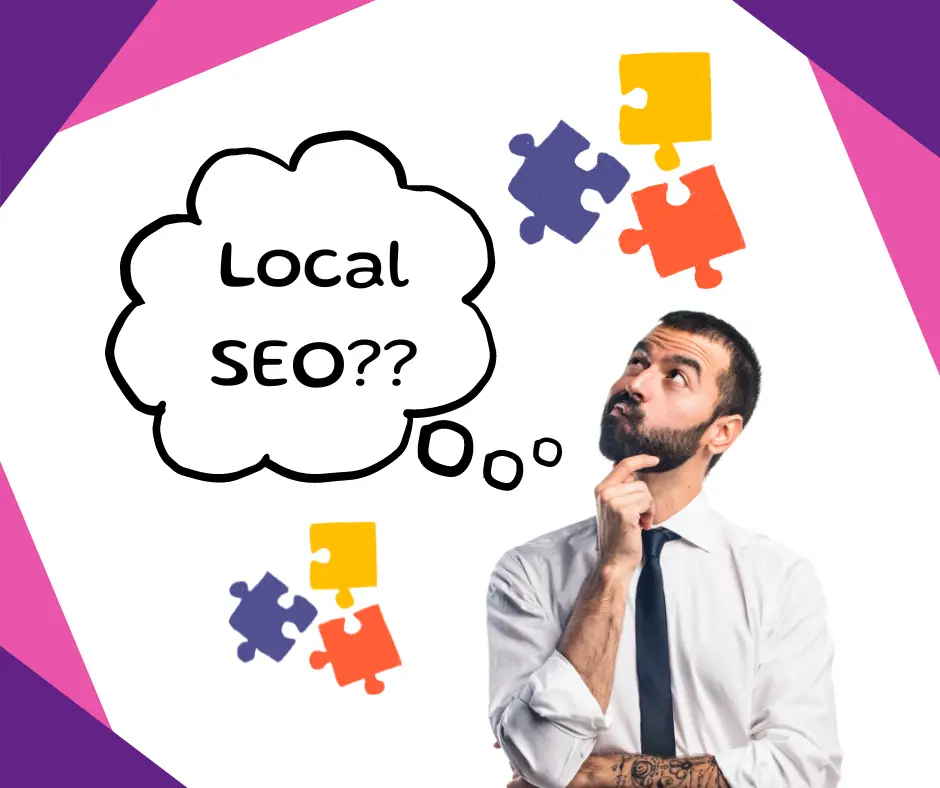
In the ever-evolving digital landscape, local businesses are harnessing the might of local search engine optimisation (SEO) to thrive in their communities. This approach, serves as a vital link, connecting businesses with potential customers nearby, cultivating loyalty, and ensuring continuous patronage.
Firstly, local SEO enhances visibility by optimising online presence, making businesses more discoverable in local searches. This heightened visibility leads to increased foot traffic, as potential customers find it convenient to explore nearby businesses with a simple online search. Moreover, a robust local SEO strategy involves garnering positive reviews, contributing to a favourable online reputation and building trust with the local audience.
Furthermore, local SEO goes hand-in-hand with the surge in mobile device usage, aligning businesses with the preferences of an on-the-go consumer base. This adaptability to changing consumer behaviour ensures that businesses stay relevant and accessible in the fast-paced digital age. In essence, local SEO domination not only boosts immediate business but also lays the foundation for sustained growth by establishing a strong local presence and fostering enduring connections with the community.
The Historical Perspective
Local SEO has a rich history, originating in the late 20th century with the rise of online business directories. The transition from traditional Yellow Pages to digital platforms marked the beginning of businesses showcasing their services to local customers. As search engines, particularly Google, underwent transformations, the concept of local SEO evolved into a comprehensive strategy. This strategy aims to optimise online presence, ensuring businesses effectively target and connect with local audiences in the digital age.
The transition from traditional directories to online platforms was pivotal, providing businesses with a new avenue for visibility. The digitisation of the Yellow Pages allowed businesses to not only list their services but also adapt to changing consumer behaviour. With the evolution of search engines, local SEO became a dynamic tool. Today, it involves fine-tuning various elements of online presence to enhance visibility in local searches, capitalising on the preferences of a digitally connected audience.
As technology advanced, local SEO embraced new features and strategies. It incorporated location-based keywords, customer reviews, and map integrations, making businesses more accessible to their immediate communities. The historical journey of local SEO highlights its adaptability, aligning with the shifting landscape of digital marketing. In essence, understanding the historical roots of local SEO unveils its evolution into a vital strategy that businesses leverage to thrive in their local communities in the present digital era.
Evolution of Local SEO
The story of local SEO domination is a journey that started humbly, rooted in the late 20th century. As businesses transitioned from traditional Yellow Pages to digital directories, the concept of local SEO began taking shape. The digitisation of business listings marked the initial step, offering businesses a platform to showcase their services to local customers online.
With the rise of search engines like Google, local SEO underwent a transformative evolution. No longer limited to mere online listings, it became a comprehensive strategy. This strategy focuses on optimising online presence to effectively target local audiences, meeting the demands of the evolving digital age.
The shift from static listings to dynamic strategies was crucial. Local SEO embraced location-based keywords, ensuring businesses appeared in relevant local searches. Integration with maps and the emphasis on customer reviews further enhanced visibility and credibility. As consumers increasingly relied on mobile devices, local SEO adapted, aligning businesses with the preferences of an on-the-go audience.
Over time, local SEO became more sophisticated, incorporating various elements for a holistic approach. The inclusion of customer testimonials, localised content, and social media signals became integral to the strategy. Businesses realised that a strong local SEO game not only brought immediate benefits but also laid the foundation for sustained growth.
The evolution of local SEO reflects its journey from a basic online directory to a dynamic and indispensable tool in the digital marketing landscape. Understanding this evolution is crucial for businesses looking to leverage the full potential of local SEO domination in the present digital marketplace.
What is Local SEO, and how is it different from traditional SEO?
Local SEO is a specialised approach that aims to optimise a business’s online presence for local searches, ensuring it appears in relevant results for users in a specific geographic area. Unlike traditional SEO, which focuses on broader search visibility, local SEO zooms in on local markets, catering to the needs of businesses with a physical presence or those targeting a specific location.

One key distinction lies in the keywords used. Local SEO incorporates location-based keywords, emphasising proximity and relevance to a specific area. This ensures that businesses align with the search queries of users looking for products or services nearby. Traditional SEO, on the other hand, often relies on more general keywords to capture a broader audience.
Another differentiator is the importance of Google My Business (GMB) listings in local SEO. Claiming and optimising a GMB listing is crucial for local businesses as it provides essential information to potential customers, including contact details, business hours, and customer reviews. Traditional SEO, while considering business listings, doesn’t emphasise them as prominently.
Local SEO places a strong emphasis on customer reviews. Positive reviews on platforms like Google and Yelp contribute to a business’s local SEO ranking and credibility. This user-generated content is a key factor in local SEO success. Traditional SEO, while valuing reviews, may not prioritise them to the same extent.
Additionally, local SEO incorporates location-based content on websites, ensuring that businesses have relevant information for local audiences. This can include location-specific landing pages, localised blog content, and service pages tailored to the needs of the local market. Traditional SEO, while recognising the importance of relevant content, may not focus as intensely on location specificity.
While both local and traditional SEO share common principles, their strategies diverge in crucial aspects. Local SEO hones in on geographic specificity, utilising location-based keywords, emphasising GMB listings, and prioritising customer reviews. Understanding these differences is vital for businesses aiming to optimise their online presence effectively in their local markets.
How does Local SEO work?
Search Engine Optimisation, is a crucial tool for businesses aiming to enhance their online presence and attract local customers. To comprehend its workings, let’s delve into the basics. Initially, search engines like Google scrutinise various factors to determine the relevance of a business to a user’s query. Local SEO specifically tailors these factors to favour local businesses, ensuring that when potential customers search for products or services in their vicinity, relevant local businesses appear prominently in the search results.
The primary focus of Local SEO is to optimise a business’s online presence, encompassing its website, Google My Business listing, and other online profiles. This involves incorporating local keywords naturally into the website’s content, meta descriptions, and title tags. Accurate and consistent business information, such as the name, address, and phone number (NAP), is paramount across all online platforms. Search engines trust this information, boosting the business’s credibility and increasing its chances of appearing in local searches.
Furthermore, customer reviews play a pivotal role in Local SEO. Positive reviews not only establish trust but also contribute to the business’s ranking in local search results. In essence, Local SEO is a multifaceted approach that combines content optimisation, accurate business information, and positive customer feedback to bolster a business’s visibility within its local community. Understanding and implementing these fundamental aspects can significantly enhance a business’s chances of being discovered by local customers searching for products or services online.
How Can I Improve My Local SEO Rankings?
In the quest to elevate your website’s visibility in local searches, a comprehensive approach to SEO is essential. By strategically addressing On-Page SEO, Technical SEO, Off-Page SEO, and Local SEO, you can fortify your online presence and effectively connect with your target audience. Each facet plays a crucial role in optimising your website for search engines while ensuring a seamless user experience and fostering community engagement.
1. On-Page SEO:
On-Page SEO refers to the practice of optimising individual web pages to enhance their visibility and ranking on search engine results pages (SERPs). Enhance your website by optimising titles, meta descriptions, and headings for relevant keywords. Ensure your content is engaging and valuable, addressing user queries effectively. Utilise clean URL structures and incorporate internal linking for a seamless user experience. Optimise images by using descriptive filenames and alt tags to improve accessibility and search engine understanding.
2. Technical SEO:
Technical SEO refers to the optimisation of the technical elements of a website to improve its visibility and performance in search engine results. It involves enhancing various aspects that impact how search engines crawl, index, and interpret the content of a site. Ensure your website’s technical aspects are sound by optimising site speed for faster loading. Create and submit a sitemap to search engines, allowing them to crawl and index your pages efficiently. Implement a secure HTTPS connection to build trust and improve rankings. Regularly audit and fix broken links to maintain a smooth navigation experience for both users and search engines.
3. Off-Page SEO:
Off-Page SEO refers to the actions and strategies taken outside of your website to enhance its visibility and credibility on search engine results pages (SERPs). Unlike On-Page SEO, which focuses on optimising elements within the website, Off-Page SEO involves external factors. Key aspects include building high-quality backlinks from reputable websites, engaging in social media activities to promote content and increase brand visibility, and encouraging positive reviews and testimonials. Off-Page SEO contributes to establishing the authority, relevance, and trustworthiness of a website in the eyes of search engines, ultimately influencing its ranking in search results. Build a strong online presence by acquiring high-quality backlinks from reputable websites in your industry. Engage in social media to increase brand visibility and encourage user interaction. Encourage customer reviews and testimonials to establish credibility and trust. Collaborate with local influencers or businesses to expand your reach and enhance your online reputation.
4. Local SEO:
Optimise your Google My Business profile with accurate information, including your business name, address, and phone number. Ensure consistency across online directories and listings to strengthen local search signals. Encourage customer reviews on local platforms to boost your business’s visibility in the community. Participate in local events and sponsorships to increase community engagement and enhance your local SEO rankings.
Tools can help with Local SEO
Establishing a robust online presence in local searches requires a strategic blend of digital tools. These tools act as the catalysts, offering insights and efficiencies crucial for navigating the intricacies of Local SEO. Now, let’s explore four key categories of tools that can elevate your local search game.
1. Local SEO Tools:
Utilise tools like Google My Business, MOZ Local, and BrightLocal to manage and optimise your business information consistently. These tools help ensure accurate and up-to-date details across various online directories, bolstering your local search visibility.
2. Keyword Research Tools:
Leverage keyword research tools such as Google Keyword Planner and SEMrush to identify relevant local search terms. Tailor your content to include these keywords naturally, enhancing your website’s chances of appearing in local search results.
3. Online Reputation Management Tools:
Employ tools like Yelp, Trustpilot, or Podium to monitor and manage customer reviews and online reputation. Responding promptly and professionally to reviews can positively impact your local SEO and build trust among potential customers.
4. Local Analytics Tools:
Use analytics tools like Google Analytics and Google Search Console to track the performance of your local SEO efforts. Monitor key metrics such as website traffic, user engagement, and conversion rates to continually refine your local SEO strategy for optimal results.
How do online reviews impact Local SEO?

Online reviews wield substantial influence on Local SEO, playing a pivotal role in shaping a business’s digital reputation. Firstly, positive reviews contribute positively to the business’s credibility, instilling trust in potential customers. These favourable reviews serve as a signal to search engines that the business is reputable and offers satisfactory products or services, thereby influencing local search rankings. Conversely, negative reviews can impact a business’s reputation and potentially hinder its local search visibility. Therefore, actively encouraging satisfied customers to leave positive reviews and promptly addressing any negative feedback is essential for effective reputation management and local SEO success.
Moreover, online reviews serve as a dynamic form of user-generated content. They provide valuable insights into the customer experience and act as a source of authentic information for other potential customers. Search engines recognise the significance of this user-generated content and consider it a valuable factor in local search rankings. Businesses should not only encourage customers to leave reviews but also respond to them promptly. Responding to reviews, whether positive or negative, showcases the business’s engagement and commitment to customer satisfaction, further enhancing its online reputation and local SEO impact.
In addition, the quantity and recency of online reviews are crucial factors. A consistent flow of recent reviews signals to search engines that the business is actively serving customers and stays relevant. Regularly obtaining reviews and maintaining an up-to-date online presence contribute to a positive local SEO performance. In conclusion, online reviews are a dynamic force in the realm of Local SEO, influencing credibility, user engagement, and ultimately, a business’s position in local search results. Businesses that actively manage and leverage online reviews are better positioned to enhance their digital reputation and thrive in the competitive local landscape.
How long does it take to see results from Local SEO efforts?
Embarking on the journey of Local SEO is an investment in your business’s online success. However, patience is essential because results don’t happen overnight. It may take a few weeks for search engines to notice and incorporate the changes made to your online presence. To build trust with search engines, it’s crucial to be consistent in updating your business information across different platforms.
The timeline for tangible results can vary. Small improvements may surface within a few months, while significant changes might require six months or more. Regularly monitoring your website’s analytics is important to gauge the impact of your Local SEO efforts. Remember that the speed of results is influenced by factors such as competition, industry specifics, and the level of optimisation.
To achieve sustained success, ongoing effort is key. As you implement Local SEO strategies, remain adaptable. The online landscape evolves, and so should your approach. Keep your content up to date, encourage customer reviews, and adjust your strategy based on changes in search engine algorithms. By staying committed and flexible, you’re likely to witness positive outcomes from your Local SEO efforts over time.
Benefits of Local SEO
- Increased Visibility in Local Search Results: Local SEO ensures that your business appears prominently in local search results, making it more visible to users in your vicinity. This heightened visibility increases the likelihood of potential customers discovering your business when searching for relevant products or services in their local area.
- Improved Website Traffic from Local Users: By optimising your website for local search, you attract more local users who are actively seeking products or services in their immediate vicinity. This targeted approach to SEO helps drive relevant and engaged traffic to your site, increasing the chances of conversions and business growth.
- Enhanced Brand Recognition within Your Community: Implementing local SEO strategies establishes a strong online presence within your community. As your brand consistently appears in local search results, it becomes more recognisable and trusted among local residents, fostering a sense of community connection and loyalty.
- Higher Conversion Rates from Local Customers: Local SEO not only brings more traffic but also attracts highly relevant users who are more likely to convert into customers. When your business is visible in local searches, it aligns with the immediate needs of local consumers, resulting in higher conversion rates and improved return on investment.
- Boosted Revenue and Sales Growth: The combination of increased visibility, targeted traffic, and higher conversion rates contributes to overall revenue and sales growth. Local SEO becomes a powerful tool in driving business success by connecting with the right audience at the right time.
- Cost-Effective Advertising for Small Businesses: Local SEO is a cost-effective marketing strategy, particularly beneficial for small businesses with limited budgets. It allows you to compete effectively in local markets without the need for extensive resources, offering a cost-efficient way to reach and engage with your local audience.
- Stronger Online Reputation through Reviews: Local SEO involves managing online reviews, contributing to the establishment of a positive online reputation. Positive reviews from satisfied local customers enhance your credibility, trustworthiness, and overall reputation, influencing potential customers in their decision-making process.
- Competitive Advantage in Local Markets: Local SEO provides a competitive edge by ensuring your business stands out in local search results. Outperforming competitors in local online visibility helps you capture the attention and preference of local consumers, ultimately gaining a competitive advantage in the local market.
- Targeted Marketing to Local Demographics: With local SEO, you can tailor your marketing efforts to specific local demographics. This targeted approach ensures that your messages resonate with the preferences and needs of your local audience, leading to more effective and impactful marketing campaigns.
- Better Online and Offline Customer Engagement: Local SEO not only improves online engagement but also fosters offline customer interaction. As local users discover and engage with your business online, it often translates into increased foot traffic, creating opportunities for meaningful face-to-face interactions.
- Increased Foot Traffic for Brick-and-Mortar Businesses: For brick-and-mortar businesses, local SEO is crucial in driving foot traffic to physical locations. By optimising for local search, you attract nearby customers who are more likely to visit your store, contributing to increased sales and overall business success.
- Geographically Targeted Advertising Campaigns: Local SEO allows for geographically targeted advertising campaigns. This precision in targeting ensures that your marketing efforts reach the right audience in specific locations, maximising the impact of your advertising spend.
- Improved User Experience on Mobile Devices: Local SEO often involves optimising for mobile users, ensuring a seamless and user-friendly experience on smartphones and tablets. This is crucial as many local searches occur on mobile devices, enhancing user satisfaction and engagement.
- Access to Valuable Local Analytics: Local SEO provides access to valuable analytics specific to your local audience. Analysing local search data helps you understand user behaviour, preferences, and trends, enabling informed decisions to further optimise your local marketing strategies.
- Integration with Google Maps and Navigation: Local SEO integration with platforms like Google Maps enhances the discoverability of your business. Users can easily find your location, contact information, and directions, improving the overall user experience and facilitating physical visits to your business.
- Consistent and Accurate Business Information: Local SEO ensures that your business information, such as name, address, and phone number, is consistent and accurate across online platforms. This consistency builds trust with both users and search engines, positively impacting your local search rankings.
- Better Customer Trust and Loyalty: Building a strong local online presence through SEO contributes to customer trust and loyalty. Consistent visibility, positive reviews, and accurate information create a positive impression, fostering a sense of trust that encourages repeat business.
- Cost-Effective Advertising for Small Businesses: Reiterating its cost-effectiveness, local SEO remains a vital tool for small businesses looking to compete with larger counterparts. It provides a level playing field, allowing smaller enterprises to gain visibility and thrive in their local markets.
- Connection with Customers on Social Media: Local SEO efforts often extend to social media platforms, enabling businesses to connect with local customers on a more personal level. Engaging with your community through social media enhances brand awareness and strengthens relationships with local consumers.
- Adaptation to Changing Local Search Trends: Local SEO is adaptable to evolving search trends, ensuring that your business remains relevant and visible in the dynamic landscape of local online searches. Staying informed and adjusting your strategies accordingly helps you maintain a strong presence in your local market.
Conclusion
Local SEO is a crucial tool for businesses in today’s digital landscape. By optimising online presence, businesses become visible in local searches, fostering community connections and ensuring sustained growth. The historical evolution of local SEO highlights its adaptability, transforming from basic directories to a dynamic strategy. The distinct features of local SEO, such as location-based keywords and emphasis on Google My Business, set it apart from traditional SEO. The working mechanism involves optimising websites, GMB listings, and incorporating customer reviews. To improve local SEO rankings, businesses must address on-page, technical, off-page SEO, and local SEO aspects. Utilising tools and understanding the impact of online reviews are essential for success. While results take time, the benefits of local SEO are substantial, including increased visibility, enhanced brand recognition, and cost-effective advertising. Ultimately, local SEO is vital for businesses, offering targeted marketing, competitive advantage, and improved customer trust in the local market.
You might also like:
Google-Proof Your Website: The Essential 2024 SEO Guide
Google Algorithm Secrets Revealed: Mastering SEO in 2024
Sharing is caring!




